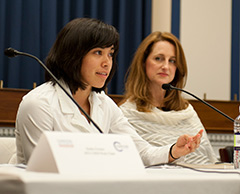Reprogramming Education
In high school, Blossom Metevier stuck to meat-and-potato science courses – physics, biology, chemistry and mathematics. She didn’t even consider computer science.
“It seemed to be just for the smelly gamers and geeks,” she says. “I took pottery instead.”
Now a sophomore at UMBC – majoring in computer science – Metevier captivated the crowd at a recent briefing on Capitol Hill as she talked about how she ultimately fell into the field. The Congressional Briefing, “Fueling the Future: Celebrating Computer Science Education Week and Computer Science in K-12 Classrooms and Policy,” was sponsored by Computing in the Core, a coalition of corporations, scientific societies, and associations. Metevier joined leaders from industry, education and non-profits in calling on Congress to ensure that more young Americans do more than just stumble upon computer science.
In her junior year of high school, Metevier realized she needed to get serious about figuring out what to study in college. “I couldn’t find anything I was passionate about in high school,” she says.
So, she did some research, learned that computer science involved a fair amount of math – which she liked – and thought it might be useful to learn about computers. So she declared computer science as a major, without having ever taken a class in the field. “When I got to college I found that I was really good at it,” she says. “It’s really about problem solving skills and algorithms, not computers.”
“Looking back,” says Metevier , “I find it very disturbing that no computer science courses are required for (high school) graduation.” And, she says, more women need to be encouraged to give the field a try.
Metevier’s experience isn’t unique. Only 27 percent of U.S. high schools have adopted the Computer Science Teachers Association’s recommended standards for computer science classes. And corporations like Oracle are pushing for computer science to be added to high-school curriculums as a core course.
Marie desJardins, a professor of computer science at UMBC, seconds that approach. “Every student should have a high-quality introduction to computer science that teaches them algorithmic problem solving, how a digital computer operates, and the capabilities and limitations of modern computers,” she says.
While government support may be limited, Oracle spends $2 billion a year on computer science education, and it’s not the only company that recognizes the need. Microsoft recently announced that, to date, it has invested $750 million in its Partners in Learning Project, an international program to train K-12 computing teachers. And Google’s CS4HS program funds universities around the world so that they can offer professional development workshops for high school computer science teachers.
Recent estimates from the U.S. Department of Labor showed that between 2010 and 2020, the country will have more than 1.4 million computing-related job openings. At current college graduation rates, only about 30 percent of those jobs could be filled by American computing graduates. While attracting students, in general, to computer science can be a challenge, attracting female and minority students has proved even more difficult. Women make up only 19 percent of all high school students taking Advanced Placement tests in computer science, according to analysis by the National Center for Women and Information Technology.
Some universities, including UMBC, have launched programs to tackle the pipeline challenge head on. UMBC’s Center for Women in Technology (CWIT) and its new Cyberscholars Program are both designed to attract female and minority students to the computer science field. The programs provide support networks, mentoring and special programming on how to study, manage time well and build a career. All of that is designed to ultimately prepare the students for the working world.
Metevier, for one, is already mapping her next steps: pursuing a master’s in computer science and, ultimately, working in industry. Metevier isn’t just talking about changing computer science. She’s doing it.
(12/18/12)

